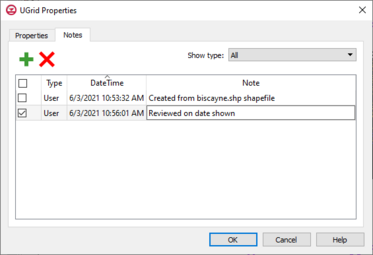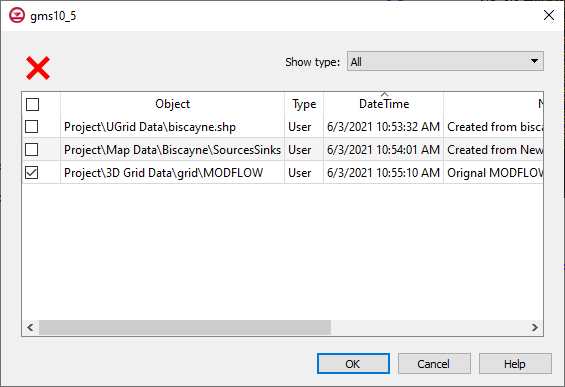GMS:Notes: Difference between revisions
No edit summary |
|||
| Line 15: | Line 15: | ||
==All Notes== | ==All Notes== | ||
All notes for all objects can be viewed via the ''Edit'' | '''Notes''' command. In this dialog, notes cannot be created, but they can be deleted. | All notes for all objects can be viewed via the [[GMS:Edit Menu|''Edit'' | '''Notes''']] command. In this dialog, notes cannot be created, but they can be deleted. | ||
[[Image:AllNotesDialog.png|thumb|none|581 px|All notes dialog]] | [[Image:AllNotesDialog.png|thumb|none|581 px|All notes dialog]] | ||
Revision as of 16:58, 24 February 2017
| This contains information about functionality available starting at GMS version 10.3. The content may not apply to other versions. |
Starting at GMS 10.3, notes can be added to most objects or to the project itself to aid in model development. For example, a model developer might add a note to a dataset used to interpolate elevations to describe the real world source of the data. Typical notes might be to describe what an object is, where it came from, or why the developer did something a particular way.
Automatic Notes
GMS will create some notes automatically if the Create GMS notes automatically option is turned on in the General tab of the Preferences dialog. Initially, automatic notes are created only on UGrids when they are created, on datasets when they are created through interpolation or the Data Calculator, or on coverages when they are created from other objects. This list may be expanded in future releases.
Object Notes
Notes for objects are accessed via a tab on the Properties dialog.
Notes are given a time stamp when they are created and the notes can be sorted by time in ascending or descending order.
The dialog has options for showing all notes, only GMS created notes, or only user created notes.
All Notes
All notes for all objects can be viewed via the Edit | Notes command. In this dialog, notes cannot be created, but they can be deleted.
GMS – Groundwater Modeling System | ||
|---|---|---|
| Modules: | 2D Grid • 2D Mesh • 2D Scatter Point • 3D Grid • 3D Mesh • 3D Scatter Point • Boreholes • GIS • Map • Solid • TINs • UGrids | |
| Models: | FEFLOW • FEMWATER • HydroGeoSphere • MODAEM • MODFLOW • MODPATH • mod-PATH3DU • MT3DMS • MT3D-USGS • PEST • PHT3D • RT3D • SEAM3D • SEAWAT • SEEP2D • T-PROGS • ZONEBUDGET | |
| Aquaveo | ||

